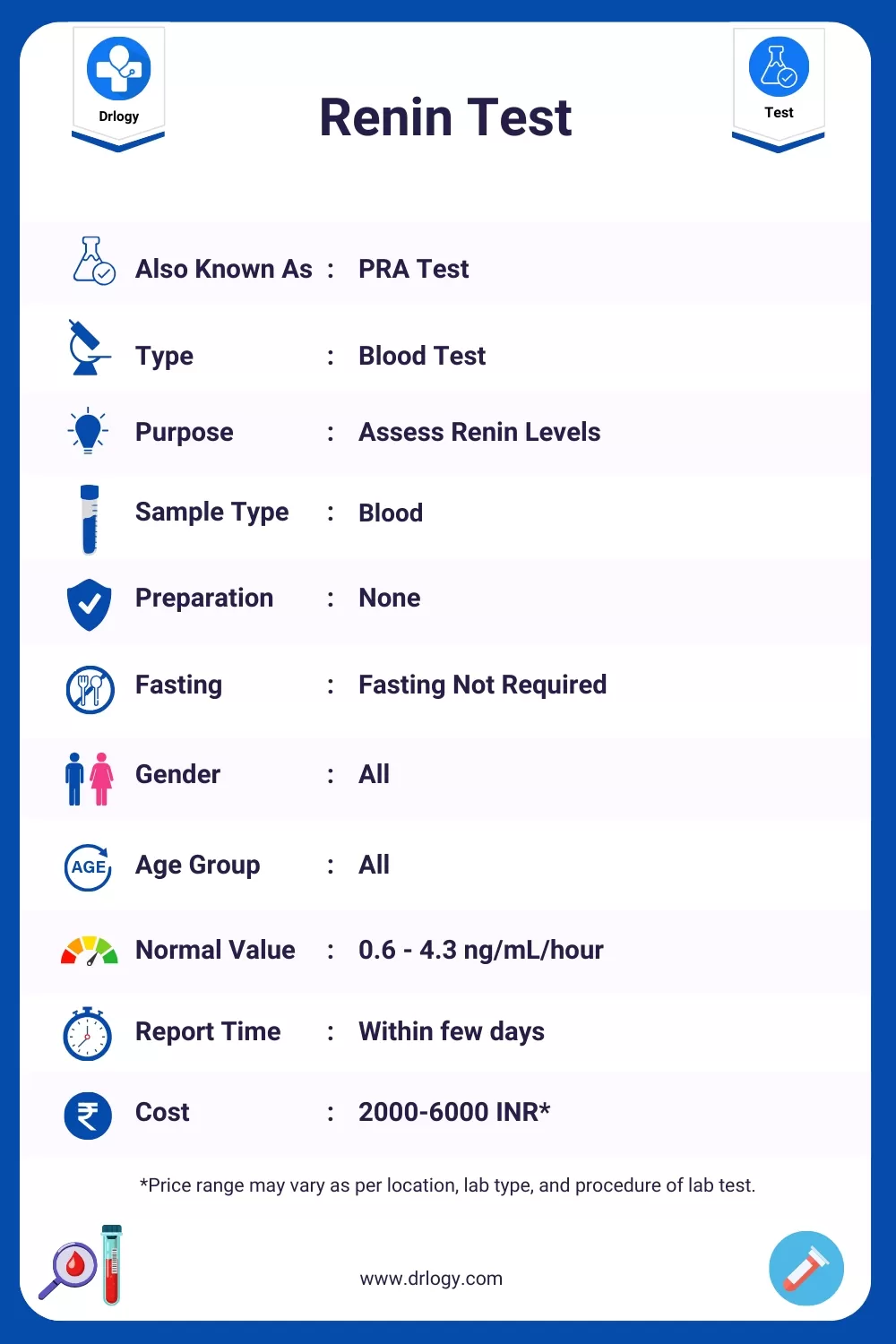
A renin test measures the level of renin in your blood, which is an hormone that regulates blood pressure and fluid balance in the body. It helps diagnose and monitor conditions related to blood pressure, such as hypertension and certain kidney diseases.
Here are the basic details of the Renin Test.
| Also Known As | Renin blood test, plasma renin activity (PRA) aldosterone-renin ratio (ARR) |
| Type | Blood Test |
| Purpose | Assess Renin Levels |
| Sample Type | Blood |
| Preparation | None |
| Fasting | Fasting Not Required |
| Gender | All |
| Age Group | All |
| Normal Value | 0.6 - 4.3 ng/mL/hour |
| Reporting Time | Within few days |
| Cost | 2000-6000 INR* |
*Price range may vary as per location, lab type, and procedure of lab test.
The Renin Test evaluates the level of renin in the blood.
The purpose of the Renin Test is to:

Here is the basic preparation for the Renin Test.
Here is the basic Renin Test Procedure.
Here are the basic Understanding Renin Test Results.
Here is the normal range of the Renin Test
| Sodium Diet | Normal Range |
|---|---|
| Normal | 0.6 - 4.3 ng/mL/hour |
| Low | 2.9 - 24 ng/mL/hour |
Here is the Interpretation of the Renin Test.
| Renin Levels | Possible Conditions or Implications |
|---|---|
| High (above normal) | Addison's disease, Dehydration, Hypokalemia |
| Low (below normal) | Excess Sodium, Salt-Sensitive Hypertension |
Renin test results can help identify potential health conditions based on the level of renin in the blood. High levels may suggest certain conditions, while low levels could indicate others.
Here are potential causes of high renin test levels.
| Potential Causes | Explanation |
|---|---|
| Renal Artery Stenosis | Narrowing of renal arteries can lead to increased renin levels as a compensatory mechanism. |
| Primary Aldosteronism | Overproduction of aldosterone can stimulate renin release and lead to high levels. |
| Chronic Kidney Disease | Impaired kidney function can result in high renin levels due to reduced blood flow. |
| Renin-Producing Tumors | Rare tumors that produce renin can cause elevated levels. |
| High Blood Pressure | Uncontrolled hypertension may lead to increased renin production by the kidneys. |
| Dehydration | Dehydration or low blood volume can stimulate renin release to help maintain blood pressure. |
| Medications | Certain drugs, such as diuretics, can affect renin levels. |
| Secondary Aldosteronism | Conditions like heart failure can lead to secondary aldosteronism and increased renin. |
Elevated renin levels can indicate various underlying conditions, and further clinical evaluation is typically necessary to determine the specific cause.
Here are potential causes of low renin test levels.
| Potential Causes | Explanation |
|---|---|
| Primary Hyperaldosteronism | Excess aldosterone production can suppress renin levels. |
| Overhydration | High fluid volume can inhibit renin release. |
| Beta-Blocker Medication | Certain medications, like beta-blockers, can lower renin levels. |
| Uncontrolled Hypertension | Extremely high blood pressure may suppress renin. |
| Chronic Kidney Disease | Severe kidney damage can reduce renin production. |
| Addison's Disease | Adrenal insufficiency can lead to low renin levels. |
| Cushing's Syndrome | Overproduction of cortisol can suppress renin. |
Low renin levels can be indicative of various underlying conditions, and further clinical evaluation is typically necessary to determine the specific cause.
Here are the specimen requirements for the Renin Test.
|
Specimen |
Serum |
|
|
Volume |
1 ml |
|
|
Container |
Red-top tube or gel-barrier tube |
|
|
Collection |
Separate serum from cells within one hour of collection. Transfer to a plastic transport tube before shipping. |
|
|
Storage |
Refrigerate or freeze. |
|
|
Sample Stability |
Temperature |
Period |
|
Room temperature |
7 days |
|
|
Refrigerated |
14 days |
|
|
Frozen |
60 days |
|
|
Freeze/thaw cycles |
Stable x1 |
|
|
Causes for Rejection |
Grossly hemolyzed; bacterial contamination; lipemic specimen. |
|
The Renin Test is generally safe and poses minimal risks.
Here is the basic limitation of Renin Test.
Here are some of the risk factors of the Renin Test.
Here are the Doctor's recommendations or consult a specialist after the Renin Test.
| Renin Level | Doctor to Consult | Reason to Visit |
|---|---|---|
| High | Nephrologist | Kidney concerns |
| Normal | General Practitioner | Routine follow-up |
| Low | Endocrinologist | Hormonal imbalance |
Here are the estimated Renin Test Prices in India with different top cities:
|
City |
Price Range (INR)* |
|
2000-6000 |
|
|
2500-6000 |
|
|
2000-6000 |
|
|
2500-6000 |
|
|
2000-6000 |
|
|
2500-6000 |
|
|
2000-6000 |
|
|
2500-6000 |
|
|
2500-6000 |
|
|
2000-6000 |
|
|
2500-6000 |
|
|
2000-6000 |
|
|
2500-6000 |
|
|
2000-6000 |
*Prices are approximate and vary depending on a specific laboratory or healthcare facility.
Summary
Overall, Renin Test is a low-risk blood test, is crucial for evaluating blood pressure and fluid balance, aiding in the diagnosis and management of hypertension and kidney-related conditions. Also check Drlogy Test for detailed information about all medical tests for patients, doctors, scholers and medical students.
Reference
DOCTOR'S MOST TRUSTED HEALTHCARE PLATFORM
10M+
Patients
30000+
Doctors
25000+
Hospitals/Labs